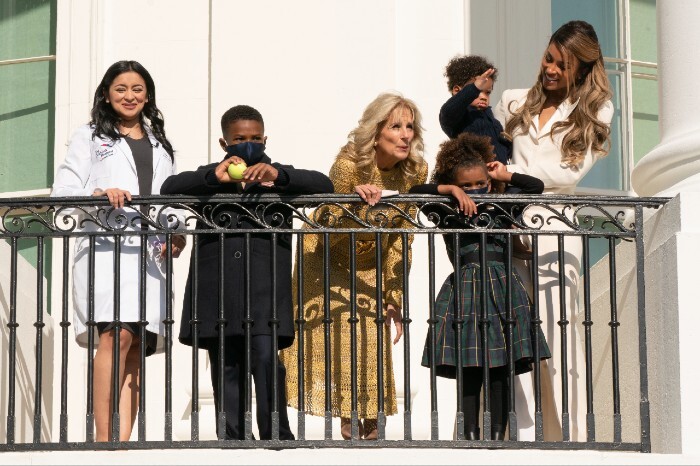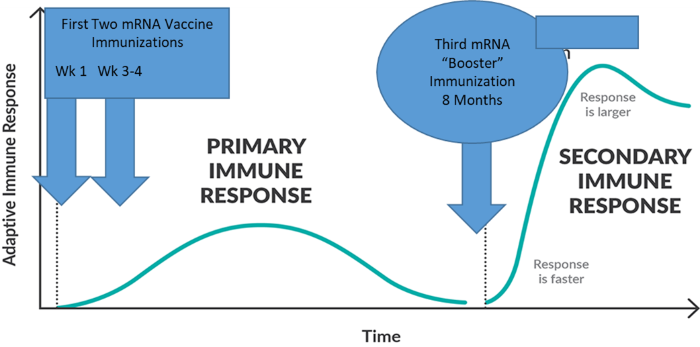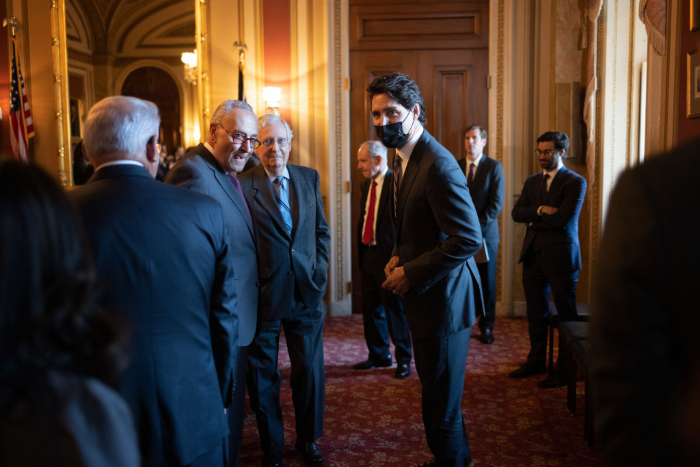| | |  | BY JOANNE KENEN | Presented by eBay | With help from Renuka Rayasam and Tyler Weyant
| 
First lady Jill Biden, singer Ciara Wilson, her children and pediatrician Hina Talib watch from the White House balcony as Biden leaves the White House. | Manuel Balce Ceneta/AP Photo | 1, 2 STEP — A lot of parents are hesitant about getting their 5- to 11-year-olds vaccinated against the coronavirus. To overcome that apprehension — and avoid the racial and ethnic trust gaps that marred the early phase of adult vaccination — the White House needs sound policy, community allies, buy-in from the public health and medical communities. And an influencer. Someone like the singer Ciara, a millennial mom of three with a huge social media following who visited the White House this afternoon to chat with First Lady Jill Biden about childhood vaccination. Not all of Ciara’s kids are yet old enough for this shot, but the singer — who is married to Seattle Seahawks quarterback Russell Wilson — said she’s a strong believer in immunization. There’s a lot more to do. Since childhood vaccination began just a few weeks ago, there’s not a lot of data that breaks down which groups are most hesitant about the safety, wisdom and necessity of immunizing their kids. As the latest Kaiser Family Foundation update on vaccination trends noted, the Centers for Disease Control and Prevention is not publicly reporting race and ethnicity vaccination data broken down into age brackets, “limiting the ability to gain insight into vaccination patterns among children.” Only three states are currently tracking that in the 5 to 11 crowd. The lack of data is worrisome, said Julie Morita, executive vice president of the Robert Wood Johnson Foundation and a former Chicago public health commissioner. “Data tells us where we’re doing a good job – and where the gaps are,” she said. “It guides us as we try to improve access and understand what the questions are” and which communities need to be engaged. When vaccination of adults began nearly a year ago, the racial and ethnic trust gaps were enormous. Since then, they were largely closed, but it took significant effort. Yet the trust that was gained for adult shots across most sectors of the public (conservative white Republicans are now the most vaccine resistant) won’t automatically carry over to ones for children. Parents don’t just worry about safety, said Kaiser’s polling expert Liz Hamel. They also worry about accessibility, about missing work to get their kids’ shots — and about cost, even though the vaccine is free. Those two issues — not only the confidence that the vaccine is safe and beneficial, but also knowing where, when and how to get the free shot — need to be addressed pronto, before fears harden, said Lisa Cooper, a physician and leading expert on health equity at Johns Hopkins. As the Ciara drop-by shows, the White House is not unaware. “Equity is the center of everything we do,” said a senior White House official who works on pandemic issues but who was only authorized to speak on background. “We’ve made substantial progress — and that reflects a tremendous amount of work.” The Biden administration is partnering with community clinics, pediatricians, rural health clinics, community health clinics, mobile clinics, pharmacies, childrens hospitals and schools, the official said. Places that are trusted, accessible, part of the neighborhood. Places that don’t only operate Monday through Friday, 9 to 5. Or in the case of schools, places where kids can get the shot at on-site clinics during their school day — with written parental consent. All in all, there are now about 30,000 sites that can vaccinate kids in this age bracket, the official said. In and out of government, experts have learned that trust in vaccines builds over time. Only about one-third of adults were ready to get a shot a year ago. Now, despite all the politicization of vaccination, 80 percent of adults have had at least one shot. While some parents might want to “wait and see” before getting the shot in their children’s arms, some kids themselves may be more eager than mom or dad realizes, Cooper said. “There’s a lot of positive energy that kids pick up from people around them,” she said, noting that her little cousin recently sent her a proud message about his injection. “They want to be able to go to sports. They want to be able to play with their friends. They want to be able to go to school and not have to stay home every time someone gets sick.” So Ciara aside, maybe it will be the kids who turn out to be the influencers. Influencing their parents. Joanne Kenen, a former POLITICO health care editor and a contributing POLITICO writer, is the Commonwealth Fund Journalist in Residence at the Johns Hopkins Bloomberg School of Public Health. Welcome to POLITICO Nightly. Reach out with news, tips and ideas at nightly@politico.com. Or contact tonight’s author on Twitter at @JoanneKenen.
| |
A message from eBay: Americans casually selling things online are just trying to make ends meet and new tax regulations could make it even harder. Starting in 2022, a single transaction over $600 – the new reporting threshold – could land small-time sellers with a 1099-K tax form. eBay believes Americans shouldn’t receive unnecessary and confusing tax forms for selling used or pre-owned goods. Learn more about eBay's position on raising the 1099-K threshold and lifting the burden on Americans. | | | | | DON’T HAVE SECOND THOUGHTS ON A THIRD SHOT — Renuka Rayasam emails Nightly: I scheduled my booster shot after hearing about my colleague Sarah Owermohle’s breakthrough Covid case. I had been putting it off. In Texas, I might be eligible but I never asked a doctor. But my family is coming to visit for Thanksgiving next week so I decided to go ahead and make an appointment. By the time I get my dose, the FDA is expected to approve a third shot of the Pfizer or Moderna vaccine for everyone in the U.S. About 10 states have already expanded booster eligibility to all adults. That extra dose isn’t a “luxury,” Anthony Fauci, director of the National Institute of Allergy and Infectious Diseases, said on Tuesday. A three-dose regimen may become the standard to be considered fully vaccinated against Covid, he said. To be honest, the booster debate has me confused. Sure, Sarah’s case of Covid doesn’t sound fun. But a case of breakthrough Covid sounds actually less worse to me than hand, foot and mouth disease, which apparently I am destined to get as a parent of toddlers. You still don’t want to get Covid, Peter Hotez, dean of the National School of Tropical Medicine at Baylor College of Medicine and co-director of the Texas Children’s Hospital Center for Vaccine Development, told me today over the phone.
| |
| | BECOME A GLOBAL INSIDER: The world is more connected than ever. It has never been more essential to identify, unpack and analyze important news, trends and decisions shaping our future — and we’ve got you covered! Every Monday, Wednesday and Friday, Global Insider author Ryan Heath navigates the global news maze and connects you to power players and events changing our world. Don’t miss out on this influential global community. Subscribe now. | | | | | There was a moment, Hotez said, when we thought we could vaccinate our way out of the pandemic. But as immunity wanes, so does the effectiveness of the vaccine at preventing Covid transmission. “That function seemed to be the first to go,” said Hotez, who will be the grand marshall of Houston’s Thanksgiving parade. Antibody levels are also quickly declining among those who have had two doses. Only a couple of months can make a big difference in the vaccine’s effectiveness. One Israeli study showed that by July, elderly individuals who had gotten their second dose in March were 1.7 times less likely to develop severe illness than those who received their second dose in January. The result is what we are seeing all around us — more and more cases of breakthrough Covid. I am wrong to underestimate my risk, Hotez said. Though data is sparse, a breakthrough case could lead to long Covid — “who wants to get that?” Hotez said — or worse. Only about 20 percent of the patients hospitalized with Covid in Colorado are considered fully vaccinated. The Biden administration has been too slow to authorize the third dose for every adult, Hotez said. “They still cling to this idea that the first and only goal should be to prevent hospitalizations,” he said. “Also I don’t want to get Covid.” There is good reason to believe that three doses could be the magic dosing number. That’s how other common childhood vaccines work, Hotez noted. And the third Covid vaccine seems to create a much stronger and faster immune response than the first two doses.
| 
Courtesy of Peter Hotez | Normally vaccine doses are spaced six months to a year apart in order to give a person’s immune system time to mount a proper response. But because the pandemic flung the globe into crisis, Pfizer and Moderna tested a two-dose, closely spaced regimen. We are learning about the effectiveness and durability of mRNA vaccines in real time — much of the data we are using to make our decisions is based on studies out of Israel and the U.K., which started vaccinating their populations earlier and keep more detailed data on outcomes. “I am of the opinion that we won’t need another booster next year,” Hotez said. He thinks we may need a fourth shot, but not for several years. “But at this point, that is still just an opinion.”
| | — House votes to punish Gosar for video depicting killing of AOC: The House censured Rep. Paul Gosar today for a social media post and booted him from his committees , a rare rebuke of a colleagues that Speaker Nancy Pelosi deemed an “emergency.” Two Republicans — Reps. Adam Kinzinger and Liz Cheney — joined all Democrats in voting for the measure, which removed Gosar from his spots on the Natural Resources and Oversight committees. Rep. David Joyce (R-Ohio) voted present. — China bill throws a wrench in Senate’s defense policy push: The Senate’s already-delayed annual defense policy bill faced yet another roadblock today, throwing the timing of the must-pass legislation into further doubt as lawmakers looked to include a China competitiveness bill. Senate Majority Leader Chuck Schumer delayed an initial procedural vote on the National Defense Authorization Act this morning, amid disagreements over the New York Democrat’s push to add long-stalled China competition legislation to the defense bill.
| |
| | A message from eBay:  
| | | — ‘QAnon shaman’ Jacob Chansley is sentenced to 41 months in prison: Jacob Chansley, whose shirtless image on the Senate rostrum and menacing note to Vice President Mike Pence came to symbolize the Jan. 6 assault on the Capitol, was sentenced today to almost three and a half years in prison, matching the harshest sentence handed down yet in the 10-month prosecution effort. “What you did here was horrific,” U.S. District Court Judge Royce Lamberth said as he issued the 41-month sentence, adding that he believed that Chansley — a self-described shaman and a follower of the QAnon conspiracy movement — had come to genuinely regret his actions. — White House seeks to boost Covid vaccine manufacturing by 1B doses a year: The Biden administration is offering to partner with Covid-19 vaccine makers on expanding their U.S. manufacturing capacity as part of an emerging plan to produce an additional 1 billion doses per year, an administration official said today. The new initiative is aimed at ramping up the vaccine supply needed abroad and comes as officials have sought new ways to make good on Biden’s pledge to get 70 percent of the world’s population vaccinated by next September. — Biden asks FTC to investigate oil and gas companies: Biden asked Federal Trade Commission Chair Lina Khan today to examine oil and gas companies and their role in rising gasoline prices. Citing “potentially illegal conduct,” Biden said pump prices are rising even as industry costs are declining.
| | | 
Canadian Prime Minister Justin Trudeau meets with Senate Majority Leader Chuck Schumer and Senate Minority Leader Mitch McConnell at the U.S. Capitol. | Win McNamee/Getty Images | INVITING THE NEIGHBORS OVER — Biden has made a point to differentiate himself on the world stage from his predecessor, Donald Trump. With Mexico and Canada, that has meant lots of talk about diplomacy, dialogue and friendship after years of Trump’s attacks and threats against the two U.S. neighbors. But Biden’s shift in approaches — less firebrand, more conciliatory — has not made him automatic friends with Mexican President Andrés Manuel López Obrador, who had an unlikely alliance with Trump, Sabrina Rodríguez and Andy Blatchford write. Nor has his personal chemistry with Canadian Prime Minister Justin Trudeau, who often clashed with Trump, meant a seamless U.S.-Canada relationship. Under Biden, disagreements and challenges with each country and the broader North American relationship abound. Biden will meet jointly in person Thursday with López Obrador and Trudeau for the first time since taking office — and he’ll have to do more than just not be Trump. For Biden, the trilateral summit — the first since 2016 — will be an exercise in building back trust and making headway on some of the thorniest issues among the countries, including migration challenges, trade irritants and charting a path for regional economic recovery from the pandemic.
| |
| | STEP INSIDE THE WEST WING: What's really happening in West Wing offices? Find out who's up, who's down, and who really has the president’s ear in our West Wing Playbook newsletter, the insider's guide to the Biden White House and Cabinet. For buzzy nuggets and details that you won't find anywhere else, subscribe today. | | | | | | | Nightly asks you: Is there something you really want or need to buy, whether for the holiday season or just an everyday item, that you’ve noticed is far more expensive or seemingly impossible to get? Send us your responses using our form, and we’ll share some answers next week.
| | | |
| | | CLIMATE GONE HOGWILD — Nightly’s Tyler Weyant writes: A touch of a spoiler for Neal Stephenson’s newest novel, Termination Shock: In the first pages, you’ll be reintroduced to a meme that’s a couple of years old: 30 to 50 feral hogs. If you don’t remember this Twitter debate over gun rights, don’t worry. What matters is that the writer who coined the term “metaverse” now takes the threat of wild boars seriously. And now, so do I. The rise of the porcine menace is but one of the many tiny details Termination Shock examines as Stephenson weighs the pros and cons of large private-sector actions to fight climate change outside of government control. As the metaverse, a concept Stephenson introduced in 1992’s Snow Crash, rockets into the real world, readers like me are left to wonder how close this vision of the fight against climate change could be to our future reality. The novel’s not-too-distant setting imagines a world where nations are still spouting platitudes about lowering carbon emissions, while adapting to the daily challenges climate change presents. People wear protective “earthsuits” to survive nearly unlivable heat. So a rich Texan comes up with an outside of novel idea to cool the planet’s climate using sulfur shot out of “The Biggest Gun In The World.” As the story moves along, the conflict aligns with our current debates over how to deal with rising seas and temperatures: Is prevention possible, or should we focus only on mitigation? How should we help people who are affected by climate disasters? And how do actions in one place affect those in far-flung corners of the globe. Not unlike Mark Zuckerberg’s new Meta vision of Stephenson’s 1992 virtual-reality concept infiltrating every nook of human life, the novel paints a future a decade-ish away where climate issues are a part of everything from the fight over the Line of Actual Control in the Himalayas to the way you stop for gas on the interstate. The realism of Stephenson’s writing does something that climate change activists often have a hard time accomplishing outside of natural disasters: Putting the lives of real people into the consequences of a warming earth and measuring the existential hardships they face.
| |
A message from eBay: Americans throughout the country turn to online marketplaces to sell used personal items to make ends meet and keep things out of landfills. A new law passed earlier this year will require millions of them to receive confusing and burdensome tax forms for their sales online, even when they don’t owe taxes because they’re selling used goods. eBay believes the new low reporting threshold will cause confusion and over-reporting of non-taxable income for millions of Americans already struggling as a result of the pandemic. Congress should protect consumers and increase the reporting threshold for platforms enabling consumer sales of goods. Learn more about eBay's position on raising the 1099-K threshold and lifting the burden on Americans. | | |
| |
|
| | Follow us on Twitter | | | FOLLOW US
|
| |
